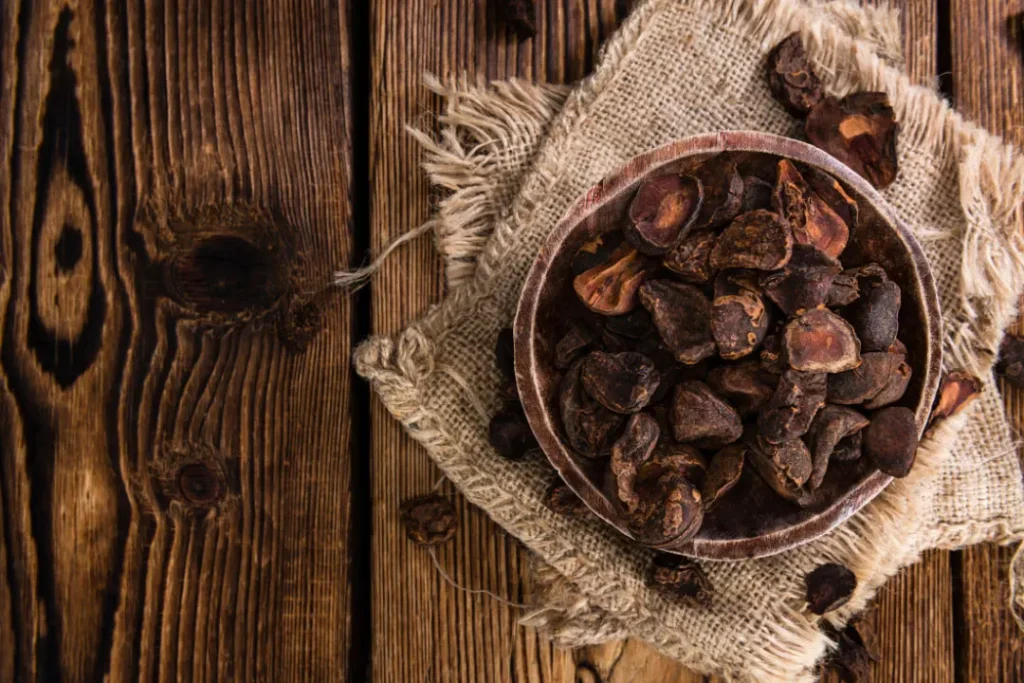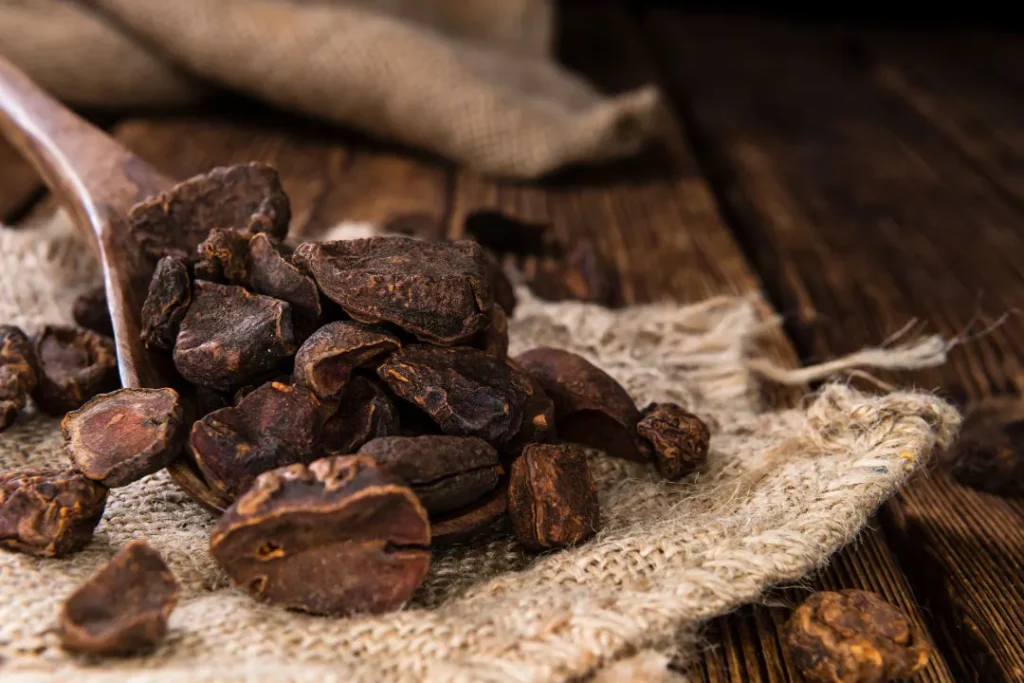Cola acuminata, also referred to as coca nut, is a tropical plant that is indigenous to West Africa. Due to its stimulating properties and potential health advantages, it has a long history of traditional use in many cultures. This article seeks to give a thorough description of the cola nut’s properties, health advantages, recommended dosage, potential side effects, drug interactions, and appropriate usage. We shall examine the physiological effects of cola nuts on the body and brain as well as their chemistry.
You May Also Like:
Canadian Hemp: Benefits, Dosage, Side Effects, Drug Interactions, and Other Important Information
Canada Balsam: Benefits, Dosage, Side Effects, Drug Interactions, and Other Important Information
Nature of Cola Nut
The Malvaceae family of plants includes the Cola nut, which has a number of bioactive chemicals. Caffeine, theobromine, tannins, flavonoids, phenolics, and alkaloids like kolanin are among the main active ingredients. These substances support the physiological impacts and pharmacological characteristics of cola nut ingestion.
Health Benefits of Cola Nuts
There are numerous health advantages to introducing Cola nuts into your diet:
- Stimulant and Energy Boost: Cola nuts contain caffeine, which stimulates the central nervous system,increases alertness, helps wakefulness, and decreases exhaustion. Both cognitive ability and physical performance may be improved by this effect.
- Appetite Suppression: Cola nuts have long been used to control hunger. Its energizing qualities lessen hunger cravings and support weight management.
- Antioxidant Properties: The cola nut’s flavonoids and phenolic content contribute to its antioxidant activity, which lowers the risk of chronic diseases like cardiovascular problems and some malignancies by reducing oxidative stress.
Diuretic Effects: Cola nuts have modest diuretic qualities that encourage better urine production and may help the body remove toxins.

Chemistry of the Cola Nut
The physiological effects of cola nuts on the body and brain are influenced by their chemical makeup. Caffeine is the most prevalent bioactive component found in cola nuts. Caffeine is a member of the methylxanthines family and stimulates the central nervous system. It works by obstructing the brain’s adenosine receptors, which prevents adenosine’s sleepy effects and increases wakefulness and alertness.
In addition to caffeine, cola nuts also contain theobromine, a xanthine molecule having stimulant properties similar to caffeine but less potent. As a vasodilator, theobromine causes blood vessels to widen, increasing blood flow and possibly enhancing cognitive performance.
Additionally, cola nuts include alkaloids such kolanin, phenolics, flavonoids, and tannins. These substances support the cola nut’s antioxidant abilities and may also provide additional health advantages, such as cardiovascular protection and anti-inflammatory actions.
Active Physiological Mechanisms of Cola Nuts
- Stimulation of the Central Nervous System: The central nervous system is stimulated by cola nuts, which is how they primarily work. The primary active ingredient, caffeine, inhibits adenosine receptors, which increases neuronal activity. This stimulation causes a rise in alertness, an increase in attention, and a decrease in weariness.
- Dopamine Activity: Consuming cola nuts have been linked to the brain’s release of dopamine. Dopamine is a neurotransmitter that affects motivation, reward, and mood regulation. Cola nuts may support feelings of well-being and improve mood by raising dopamine levels.
- Adrenergic Stimulation: The caffeine in cola nuts activates the production of norepinephrine, a neurotransmitter crucial to the body’s reaction to stress. Increased heart rate, raised blood pressure, and improved physical performance may result from this release.
- Metabolic Efficiency: Theobromine and caffeine in cola nuts can have thermogenic effects that speed up metabolism and encourage the breakdown of fat. The potential advantages of cola nut consumption for weight loss may be influenced by this metabolic stimulation.

Optimal Dosage of Cola Nuts
The ideal dosage of cola nut is determined by multiple variables, including a person’s age, general health, sensitivity to stimulants, and intended effects.
As a general rule, it is advised to begin with a modest dosage and raise it gradually as tolerance grows. Cola nut extract has frequently been utilized in studies examining its effects on mental function and physical performance at doses ranging from 50 to 300 mg per day. Individual responses, however, may differ, so it is best to speak with a healthcare provider for advice on the best dosage.
Side Effects of Cola Nuts
Although cola nuts are generally considered to be safe for ingestion, they can have certain unwanted consequences, especially if you ingest them in large quantities and you are also sensitive to certain stimulants. Possible negative effects include:
- Insomnia: Consuming cola nuts close to bedtime may disrupt sleep cycles and cause insomnia due to their stimulating effects.
- Gastrointestinal Disturbances: You may incur digestive problems such as indigestion, heartburn, or more frequent bowel motions.
- Temporary Rises in Heart Rate and Blood Pressure: The caffeine in cola nuts may result in transient rises in heart rate and blood pressure. If you struggle with any cardiovascular diseases or hypertension, you should use caution and speak with a healthcare provider before eating any cola nuts.

Potential Substance Interactions with Cola Nuts
Like other substances, Cola nuts may interact with some prescription drugs or dietary supplements. You should consider the following occurrences:
- Possible Effects From Caffeine: Cola nuts contain caffeine, which may interact with drugs like certain antibiotics, anticoagulants, and psychiatric treatments. The use of such medications should be discussed with a healthcare provider.
- MAOI Interaction: Consuming cola nuts while taking monoamine oxidase inhibitors (MAOIs) may intensify their effects and have detrimental consequences on the cardiovascular system.
Responsible Uses of Cola Nuts
Take into account the following suggestions to guarantee the proper use of cola nuts:
- Moderation: Cola nuts should only be consumed in the amounts advised by a health professional.
- Timing: To reduce the possibility of sleep problems, be careful when consuming.
- Individual Considerations: Before adding cola nuts to your regimen, think about your medical history, current medications, and susceptibility to stimulants. It is advised to speak with a healthcare provider, especially for people with pre-existing problems.
Cola nuts have a long history of usage in traditional medicine due to their naturally stimulating qualities and potential health benefits.
It is essential for safe and effective use to understand its nature, health advantages, ideal dosage, potential adverse effects, substance interactions, and responsible uses. While cola nuts can boost energy and improve cognitive blood flow, it’s important to utilize them responsibly by exercising moderation and taking into account personal circumstances.
As usual, You ought to seek medical advice before consuming Cola nuts, especially if you are taking particular medications or have any specific health issues.

Cola Nut: Conclusion
The Cola nut is iconic for many reasons today, as well as throughout history. Interestingly enough, the Cola nut, as its name implies, was at one time the primary flavoring agent used in the soft drink Coca-Cola. To this day, they can host ample health benefits when included in your own diet.
Remember, like with all supplements, it is vital that you introduce them concernedly and with an abundance of caution. Start with a modest amount and grow it gradually as you see fit with how your body reacts to them.
References:
- “Kola Nut.” Retrieved from: ScienceDirect. https://www.sciencedirect.com/topics/agricultural-and-biological-sciences/kola-nut
- “Kola nut: so much more than just a nut.” Retrieved from: National Linrary of Medicine. https://www.ncbi.nlm.nih.gov/pmc/articles/PMC3842857/
- “Caffeine: How does it affect blood pressure?” Retrieved From: https://www.mayoclinic.org/diseases-conditions/high-blood-pressure/expert-answers/blood-pressure/faq-20058543
Important Note: The information contained in this article is for general informational purposes only, and should not be construed as health or medical advice, nor is it intended to diagnose, prevent, treat, or cure any disease or health condition. Before embarking on any diet, fitness regimen, or program of nutritional supplementation, it is advisable to consult your healthcare professional in order to determine its safety and probable efficacy in terms of your individual state of health.
Regarding Nutritional Supplements Or Other Non-Prescription Health Products: If any nutritional supplements or other non-prescription health products are mentioned in the foregoing article, any claims or statements made about them have not been evaluated by the U.S. Food and Drug Administration, and such nutritional supplements or other health products are not intended to diagnose, treat, cure, or prevent any disease.


